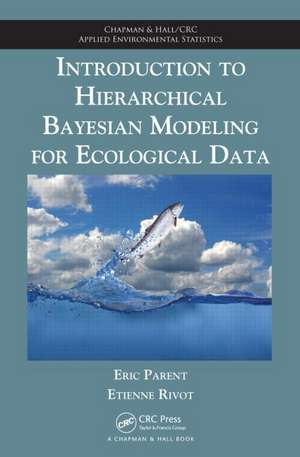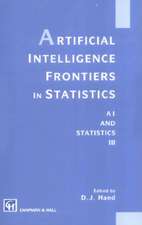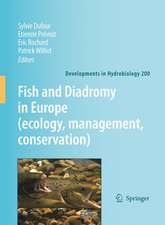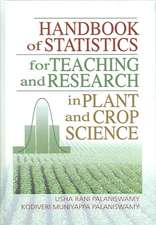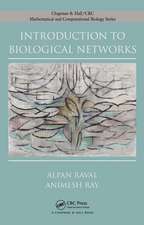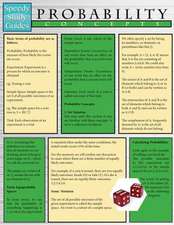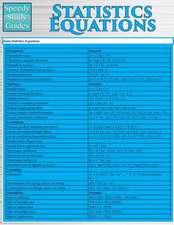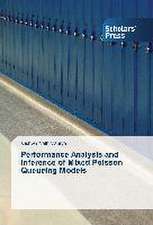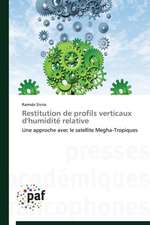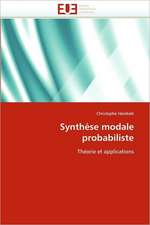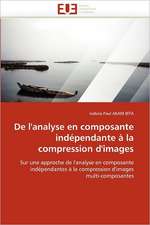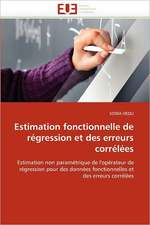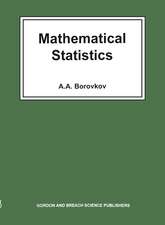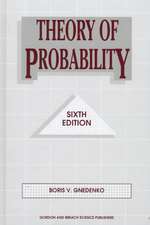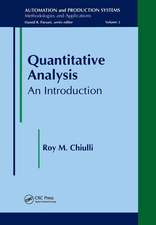Introduction to Hierarchical Bayesian Modeling for Ecological Data: Chapman & Hall/CRC Applied Environmental Statistics
Autor Eric Parent, Etienne Rivoten Limba Engleză Hardback – 21 aug 2012
The text begins with simple models that progressively become more complex and realistic through explanatory covariates and intermediate hidden states variables. When fitting the models to data, the authors gradually present the concepts and techniques of the Bayesian paradigm from a practical point of view using real case studies. They emphasize how hierarchical Bayesian modeling supports multidimensional models involving complex interactions between parameters and latent variables. Data sets, exercises, and R and WinBUGS codes are available on the authors’ website.
This book shows how Bayesian statistical modeling provides an intuitive way to organize data, test ideas, investigate competing hypotheses, and assess degrees of confidence of predictions. It also illustrates how conditional reasoning can dismantle a complex reality into more understandable pieces. As conditional reasoning is intimately linked with Bayesian thinking, considering hierarchical models within the Bayesian setting offers a unified and coherent framework for modeling, estimation, and prediction.
| Toate formatele și edițiile | Preț | Express |
|---|---|---|
| Paperback (1) | 312.43 lei 6-8 săpt. | |
| CRC Press – 30 iun 2020 | 312.43 lei 6-8 săpt. | |
| Hardback (1) | 1009.74 lei 6-8 săpt. | |
| CRC Press – 21 aug 2012 | 1009.74 lei 6-8 săpt. |
Din seria Chapman & Hall/CRC Applied Environmental Statistics
- 8%
 Preț: 439.03 lei
Preț: 439.03 lei - 9%
 Preț: 606.80 lei
Preț: 606.80 lei - 16%
 Preț: 242.01 lei
Preț: 242.01 lei -
 Preț: 436.14 lei
Preț: 436.14 lei -
 Preț: 435.98 lei
Preț: 435.98 lei -
 Preț: 360.51 lei
Preț: 360.51 lei - 11%
 Preț: 319.26 lei
Preț: 319.26 lei - 18%
 Preț: 1009.91 lei
Preț: 1009.91 lei - 12%
 Preț: 325.34 lei
Preț: 325.34 lei - 12%
 Preț: 312.43 lei
Preț: 312.43 lei -
 Preț: 402.30 lei
Preț: 402.30 lei -
 Preț: 436.15 lei
Preț: 436.15 lei - 15%
 Preț: 595.12 lei
Preț: 595.12 lei - 12%
 Preț: 301.69 lei
Preț: 301.69 lei - 15%
 Preț: 604.75 lei
Preț: 604.75 lei - 12%
 Preț: 305.29 lei
Preț: 305.29 lei - 23%
 Preț: 492.51 lei
Preț: 492.51 lei
Preț: 1009.74 lei
Preț vechi: 1231.39 lei
-18% Nou
Puncte Express: 1515
Preț estimativ în valută:
193.24€ • 199.63$ • 160.82£
193.24€ • 199.63$ • 160.82£
Carte tipărită la comandă
Livrare economică 25 martie-08 aprilie
Preluare comenzi: 021 569.72.76
Specificații
ISBN-13: 9781584889199
ISBN-10: 1584889195
Pagini: 432
Ilustrații: 100 b/w images
Dimensiuni: 156 x 234 x 23 mm
Greutate: 0.73 kg
Ediția:New.
Editura: CRC Press
Colecția Chapman and Hall/CRC
Seria Chapman & Hall/CRC Applied Environmental Statistics
ISBN-10: 1584889195
Pagini: 432
Ilustrații: 100 b/w images
Dimensiuni: 156 x 234 x 23 mm
Greutate: 0.73 kg
Ediția:New.
Editura: CRC Press
Colecția Chapman and Hall/CRC
Seria Chapman & Hall/CRC Applied Environmental Statistics
Public țintă
Professional and Professional Practice & DevelopmentCuprins
I Basic Blocks of Bayesian Modeling: Bayesian Hierarchical Models in Statistical Ecology. The Beta-Binomial Model. The Basic Normal Model. Working with More Than One Beta-Binomial Element. Combining Various Sources of Information. The Normal Linear Model. Nonlinear Models for Stock-Recruitment Analysis. Getting beyond Regression Models. II More Elaborate Hierarchical Structures: HBM I: Borrowing Strength from Similar Units. HBM II: Piling up Simple Layers. HBM III: State-Space Modeling. Decision and Planning. Appendices. Bibliography. Index.
Notă biografică
Éric Parent is head of the Research Laboratory for Risk Management in Environmental Sciences (Team MORSE) and a professor in applied statistics and probabilistic modeling for environmental engineering at the National Institute for Rural Engineering, Water and Forest Management (ENGREF/AgroParisTech) in Paris, France. Dr. Parent’s research encompasses Bayesian theory and applications, with special emphasis on environmental systems modeling.
Étienne Rivot is a researcher in the Fisheries Ecology Laboratory at Agrocampus Ouest in Rennes, France. Dr. Rivot’s research focuses on the application of Bayesian statistical modeling for the analysis of ecological data, inference, and predictions.
Étienne Rivot is a researcher in the Fisheries Ecology Laboratory at Agrocampus Ouest in Rennes, France. Dr. Rivot’s research focuses on the application of Bayesian statistical modeling for the analysis of ecological data, inference, and predictions.
Recenzii
"This book is a welcome addition to the Bayesian literature. It is well written and amply illustrates Bayesian methods with practical applications in fisheries management. The programs for data analyses are available on the book’s website, allowing users to get their ‘hands dirty’ and in the process really understand the model construction and the software."
— Subhash R. Lele, Ecology, 95(1), 2014
"The book is well written and easy to read, and the material presented deserves a greater exposure in taught statistics courses. I thoroughly recommend the book and believe that the statistical techniques and their application to quantitative fisheries science could ideally complement a short undergraduate course in applied statistics."
—Carl M. O’Brien, International Statistical Review (2013), 81
— Subhash R. Lele, Ecology, 95(1), 2014
"The book is well written and easy to read, and the material presented deserves a greater exposure in taught statistics courses. I thoroughly recommend the book and believe that the statistical techniques and their application to quantitative fisheries science could ideally complement a short undergraduate course in applied statistics."
—Carl M. O’Brien, International Statistical Review (2013), 81
Descriere
Making statistical modeling and inference more accessible to ecologists and related scientists, this book gives readers a flexible and effective framework to learn about complex ecological processes from various sources of data. It shows how Bayesian statistical modeling provides an intuitive way to organize data, test ideas, investigate competing hypotheses, and assess degrees of confidence of predictions. It also illustrates how conditional reasoning can dismantle a complex reality into more understandable pieces. Data sets, exercises, and R and WinBUGS codes are available on the authors’ website.
